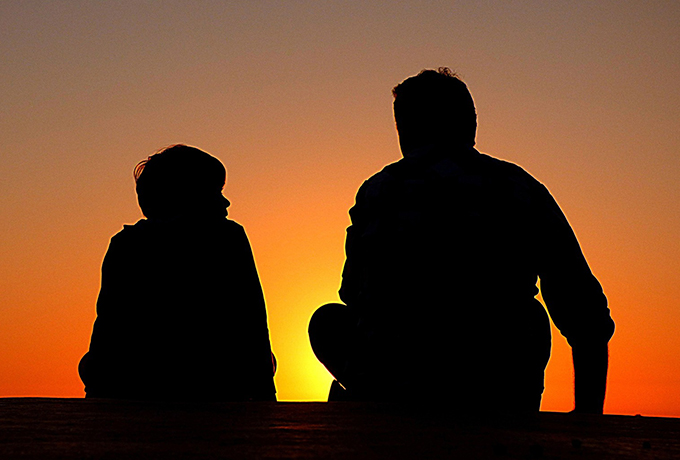Where did my life go? How to have a social life with a baby
Research shows that over half of first-time parents felt lonely and socially isolated. Let’s look at some ways new fathers can avoid social isolation with a newborn.
Read moreFather’s Day can be a difficult and confronting time. Here are some tips on how to cope on Father’s Day, whether you’re a dad, step-parent, partner or family member.

Father’s Day is a big day on the Australian calendar. Widely celebrated, the occasion is intended to celebrate fatherhood and the many great and wonderful aspects of what it means to be a dad.
For better or worse, Father’s Day has also become highly commercialised. Father’s Day is a major sales opportunity among retailers, who order stock and plan promotions months ahead of time to capitalise on the event. Consequently, the huge amount of advertising telling us to spend and celebrate in the lead-up to Father’s Day can be difficult to avoid.
It would be nice to think that Father’s Day is cause for celebration — and for many dads and families it is.
For many others though it’s just not that simple. Perhaps there’s family separation or breakdown; death or loss; a disrupted, difficult, dysfunctional or absent relationship between dad and family; illness or injury; or a multitude of other possibilities.
As Father’s Day approaches, the constant stream of advertising and messages on TV and social media can become painful reminders. For some dads or their families it can bring up difficult and complicated memories and thoughts. Here are some situations where that might occur.
Whether you’re a dad, step-parent, spouse, family member or father figure, there are many things that can be done on Father’s Day which can help ease complicated or painful situations.
Some families just don’t do Father’s Day. They might see it as inappropriate due to family history, or perhaps they regard Father’s Day and Mother’s Day as unnecessarily commercialised.
If you’re organising a Father’s Day event, talk to the person (or people) most likely to be affected. If that person happens to be you, talk to the organiser. The benefits of a simple conversation can be quite surprising.
It’s called Father’s Day, not Biological Father’s Day and its purpose is to celebrate the value of fatherhood. There’s no rulebook that says Father’s Day excludes step-parents or de-facto partners who are father figures.
In some step-families, Father’s Day is entirely natural. For others, it is not — but does it have to be? Does the nature of the step-family relationship prevent you from asking whether it should be celebrated?
Consider also that Father’s Day in a step-family doesn’t need to be a big undertaking. For example, what if mum’s partner has been around long enough to have become a good father figure? If you haven’t celebrated the day before, could it begin with something simple like a phone call and an acknowledgment of the important role he’s fulfilled?
If a Father’s Day event is celebrated with an outing, consider a back yard or at-home event instead of a restaurant if there’s concern that you or someone else could find the day difficult.
Although any celebration is likely to elicit some level of emotion, a more casual outdoor occasion (like a barbeque) would allow the person who is having a hard time to at least move around as they please or duck inside if they need a moment alone.
Consider making the event one with activities to act as distractions. An outdoors setting in nature, a trip to the footy or dinner at home followed by a night out at the movies are good examples.
Father’s Day can be especially tough if it’s a reminder of a loved one who died. Rather than bottling up or trying to ignore these feelings, consider making the day a celebration of someone’s life. Watch a movie together, make a meal, do what used to be one of dad’s favourite activities, and most importantly — be prepared to talk about the good things.
Be aware and prepared for the fact that this may trigger strong emotions. It may, for the moment, not feel pleasant. However, it is usually better to get those thoughts and feelings ‘out’ rather than ignore them.
It also helps to think of the event as a celebration of someone’s best qualities, rather than as a reminder of mourning.
The are many more reasons why Father’s Day could be a difficult or emotionally confronting. For some, it may touch on painful and unresolved thoughts and feelings. For instance, it may be that relationship with dad (or your kids) was difficult, felt dysfunctional, or was absent altogether.
It may even be that some people want to be dads but for any number of social or physical reasons (discrimination, mental illness, infertility, disability, etc.) may not able to do so.
One of the best things that anyone can do in these situations is talk about it. If you want to ask someone how they’re going, be open and sincere. Don’t be judgemental about their answer. Be a good listener and don’t relate it back immediately to yourself. Keep in mind also that someone not talking about their sadness or stresses doesn’t mean they’re not feeling it.
If you need to talk it out, talk to a MensLine counsellor.
MensLine Australia is available 24 hours a day, seven days a week, with professional counsellors providing information and support for all emotional health and relationship issues. Call us on 1300 78 99 78 or access online counselling.
Research shows that over half of first-time parents felt lonely and socially isolated. Let’s look at some ways new fathers can avoid social isolation with a newborn.
Read more
Do you ever hear parents exclaim “Back in my day…” in relation to the difference between how they were raised and how their children are being brought up? Perhaps you too notice differences between the way you were raised and the way you are raising your child?
Read more
No parent ever wants to hear that their child is a victim of a bully. Here are some tips on how to be a good dad and help your kids through this difficult time by recognising bullying and helping put a stop to it (without getting all Clint Eastwood about it). #BullyingNoWay
Read more
Developing healthy, honest communication patterns can help build foundations that ensure our families feel supported and can support you.
Read more